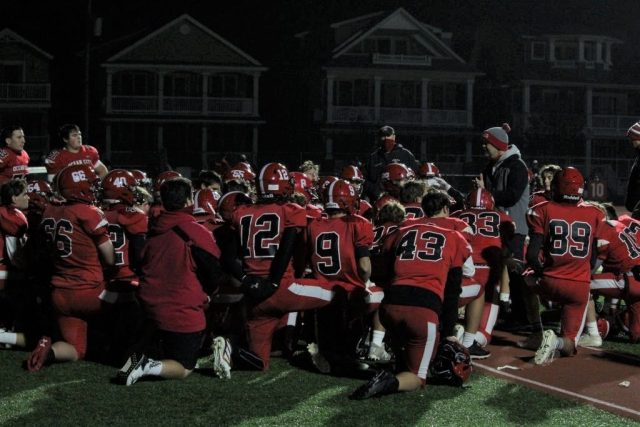
As the head coach of the football program at Ocean City High School, it was a challenging fall as we attempted to complete a season amidst the raging coronavirus pandemic. Ours took some interesting twists and turns, to say the least. I thought people might like to read about what the young men in our program went through in order to make it happen. Their sacrifices, the discipline it took, the successes they enjoyed and the setbacks they encountered. Here it is, then, a first-hand account of how high school football intersected with a global pandemic in the strangest and most fascinating way. I hope you find it worthwhile. – Kevin Smith
The news arrived in late June, just as summer training sessions were set to begin: The high school football season in New Jersey was being postponed. Concerns were high that the raging coronavirus pandemic, which had already placed a hold on the NBA, NHL and major league baseball seasons, would render tackle football too dangerous in the fall. New Jersey did not cancel high school football outright, as several states had already done, but fears were high a cancellation was coming.
For the players and staff at Ocean City High School, where I was about to enter my ninth year as head coach, this was potentially devastating news. We had made it to the South Jersey championship game the previous season, losing to a regional powerhouse. It was our first trip to the finals in 19 years, and we returned eight starters on both sides of the football from that team. We had the foundation for our best team in a generation and the seniors, twenty of them, were hungry to complete the job they had started. Our offseason training program had centered on one theme: FINISH. We believed it was championship-or-bust in 2020.
We gathered the team on Zoom shortly after receiving news of the postponement. I informed the players to stay positive, keep training, meet in small groups (no more than ten were permitted to train together at the time) and work on the plays we were installing in our virtual playbook.
The seniors stayed on after the underclassmen were dismissed. Many were standout baseball, track and lacrosse players who had lost those seasons to the pandemic in the spring. They talked about their fears of losing football, too, and of what it meant to them.
Some were emotional. “We’ll do whatever it takes, Coach,” one of our captains said. “Write the mayor, the governor, just tell us who.”
I told them to hang in, stay focused and be responsible in social settings. “It’s going to be hard,” I said, “but you have to avoid large gatherings.” Asking 17 year-old boys in a place like Ocean City, a summertime beach resort that is packed with girls and parties, to shut themselves off socially seemed like a special type of cruelty. No one protested. “Whatever it takes,” they said. Then we waited.
Word came from the state in mid-July that we could begin training at the end of the month. Covid numbers in New Jersey had declined to the point where the governor was willing to give fall sports a shot. To say our players were thrilled would be a gross under-statement. With strict protocols in place, our first day together was little more than a glorified conditioning session with the team separated into pods of no more than ten players each. Still, it was as much a celebration as it was a practice. I’ve never seen young men gleefully run sprints in 90-degree heat before.
The summer was divided into “phases.” Phase I was small pods and light conditioning. Phase II allowed larger pods and helmets. In Phase III we were permitted to have full team activities and wear shoulder pads. A school could progress from one phase to another after two weeks if they had no positive tests. A single positive, however, would shut them down indefinitely. We watched, nervously, as one area school after another got shut down or set back.
Happy as we were to be practicing, the situation felt unsustainable. We had 70 kids on our varsity roster. With virus numbers destined to spike as people flocked to the shore for the summer, how would we avoid someone getting sick? We felt overwhelmed at times with the burden of trying to keep our players safe. Were we putting them at risk? Were we endangering ourselves? Was this all irresponsible?
We leaned on our trainer, Kathy Moran (“Kickish,” her maiden name, as she was affectionately known by our players) to make the environment as safe as possible. We showed up for practice each day with our Covid-forms in hand declaring we were symptom-free, had our temperature taken and crossed our fingers. “Appreciate each day we have together,” the coaches preached. “We don’t know when it could be our last.”
In September, “real” football returned to New Jersey. The sound of pads popping finally pierced the din of the Atlantic Ocean and the amusement rides that loomed just beyond our playing field.
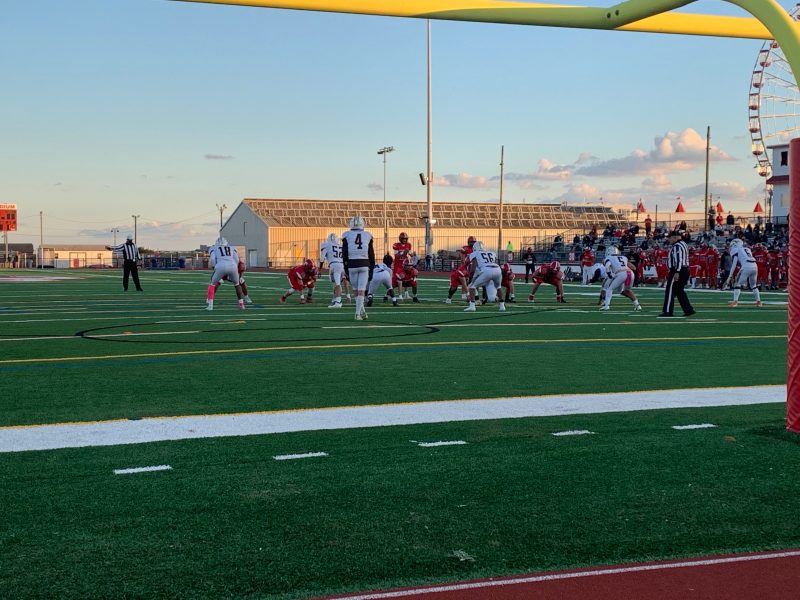
The best moment of the month was when we did our first live contact drill. Each summer, when the pads go on, we do a drill I’ve borrowed from the Pittsburgh Steelers called “Seven Shots.” The starting offense gets seven plays to score from the two-yard line against the starting defense. The first unit to win four times claims the drill. At Ocean City, “Seven Shots” has become a sign the regular season is imminent.
Tackle football is the most popular team sport in America but playing the game isn’t for everyone. You find out a lot about which young men are up for the challenge and which ones are not once the real hitting begins. No one can hide in a drill like “Seven Shots,” where the name of the game is to be fast and be physical. The defense dominated the first round but the offense rallied to win the second. It was a great competition and we could see our players were ready. There was too much smack-talking for my liking, however, and I had to lecture the team, in no uncertain terms, to shut their mouths and let their play speak for itself. I rarely quote Tom Brady, but in this instance it was necessary.
“When you lose, say little,” I told them. “When you win, say less.” It was a lesson we needed to learn. And, honestly, it felt great to lecture them on something other than wearing a mask and washing their hands.
Our regular season began the first week of October. The state had announced we would play an abbreviated schedule. Six games, with a two-game post-season for those who qualified. It wasn’t ideal but it was something. The promise of a post-season energized our players. The opportunity to FINISH was still in play. In theory, anyway.
With a shutdown looming at every turn, we decided to honor our seniors on opening night. This was usually something we reserved for our final home game. But ANY game could be the final one so we held our Senior Night week one. The crowd was limited by state mandate to 500 people, and the “Raider Nation” student cheering section that got our stadium rocking was largely absent. Still, we came flying out of the gate, won 49-7 and kicked off an October for the ages.
By the end of the month we were 4-0 and had outscored our opponents 178-30. Our defense was playing at a ridiculous level. They scored six defensive touchdowns in the first four games while yielding just four to the opposition. We didn’t have a bunch of scholarship kids – the biggest offer any of our players had received was to William & Mary – but we had tough, coachable players.
The team was typified by two-year captain Jake Inserra, a 5’9, 190-pound senior linebacker, who was so smart we often let him set the front during games. That’s next-level stuff for high school kids. Anyone reading this who was an undersized athlete making the most of their physical ability would feel a kinship to Jake. He’s the kid who shows up to practice half an hour early to get in some extra footwork. The senior who seeks out a freshman in the weight room to make him his lifting partner. The player ready to email the governor with his plea to let us play.
Jake would often break the team down at the end of practices. He would close by saying “NFS,” which was a phrase I can’t translate here but which meant, loosely, don’t do anything stupid to jeopardize our season. Each weekend, games throughout the state were being lost to positive tests. It felt like we were constantly dodging bullets. We knew a game could be canceled because of some other school’s misfortune or lack of discipline.
A self-inflicted wound, however, was unacceptable. “Have some discipline on the weekends,” Jake would tell the team. “And if you don’t feel well, stay home!”
Offensive coordinator Paul Callahan often summed up Jake by saying, “That kid is a king.” The staff was in agreement – we’d never coached anyone like him.
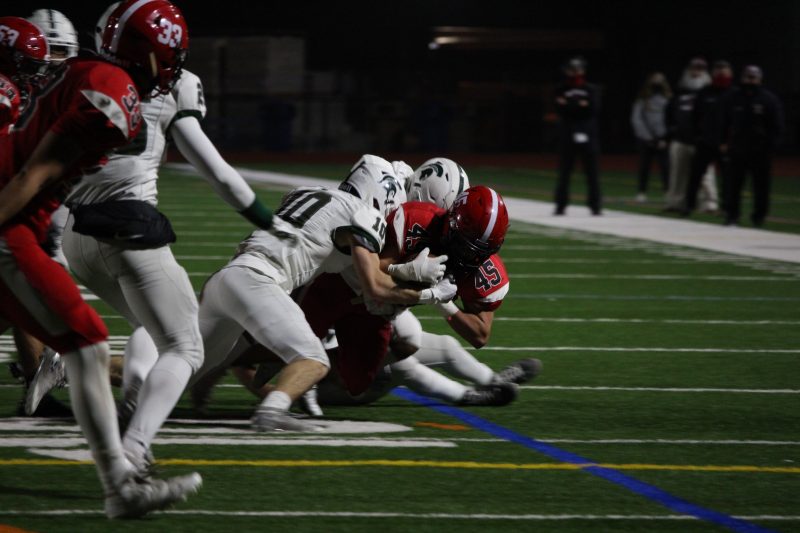
The first week in November produced our rivalry game. Ocean City is a barrier island andour opponent (Mainland Regional High School) was located directly over the bridge that connects the two communities. We referred to them as “That Team Across the Bridge.”
We vied for the “bridge trophy” that was awarded to the winner of the contest and the bridge that joined us was lit up in the colors of the victor the following week. It was the kind of rivalry that made high school football special – two schools separated by a few miles, close-knit communities that resembled one another, football games that often went to the wire with bragging rights considered sacred. We won, 63-0. It was the most lopsided contest in the history of the rivalry.
That catapulted us into the playoffs against perennial state-power St. Joseph-Hammonton, a private school we hadn’t beaten since 1974. They were loaded with scholarship players – a linebacker going to Army, a defensive end headed to Rutgers, a tackle to Georgetown – and their coach was the winningest in South Jersey football history with over 300 career victories. When we last played, in 2017, St. Joe won 46-7. It was a tall task, to say the least.
We kicked off to open the game and St. Joe immediately drove down the field for a touchdown. We got the ball, went three-and-out and had to punt. It looked like our kids didn’t believe they could win. But then we got a stop on defense, a big punt return and were able to kick a field goal. Those points on the board changed everything. The momentum shifted and our confidence grew. We played faster and more physically. The hitting was ferocious.
We scored before halftime to go up 10-7. In the fourth quarter, we recorded a safety to push the lead to 12-7. Finally, with under a minute to play and St. Joe driving, we intercepted a pass near our goal line and were able to kneel out the clock for the victory. It was an historic win for our program and it sent us to the championship game for a second consecutive season. We would have an opportunity to make good on the mantra we’d been preaching since offseason workouts had started the previous December. An opportunity to FINISH.
We prepared for the championship game. Our opponent was Camden High, a gifted program with a storied history. The game would be at home, which gave us an advantage. We did our weekly install on Monday and held a spirited, full-pads practice on Tuesday. Guys were flying around, playing fast and confident. Wednesday came. Our coaches worked on practice scripts. We were two days away.
On my lunch break, our athletic director came into the classroom where I was eating and watching film. He got straight to the point. “Camden called,” he said. “The game is off.”
I stared back, incredulously. “What do you mean?” I said.
“Their district doctor is citing rising Covid numbers,” he responded. “He won’t let them travel.”
I didn’t understand what he was saying. No one on their team had tested positive. They had participated in several away games already. This was a championship game. What did he mean they couldn’t travel?
“That’s what they’re saying,” he said.
I texted our coaches. What should we do? There had to be a solution. It was suggested we travel to their place. We’d be voiding home field advantage, which we’d earned, but what was the alternative? I met with our senior leaders and told them what was happening. I asked them, “Do you want to play the game at Camden?” Each one, to a man, said yes.
We offered – Friday afternoon at their place. Camden said no. Something about how their team doctor wasn’t available at that time. We said we would bring our team doctor. They said no again. We contacted the league president. What can we do? Not much, he said. If they cite Covid concerns, we can’t force them to play. A voided game would go down as a no-contest.
A no-contest? In a championship game we had earned the right to host and were willing to go on the road to play? That couldn’t be. We made a last-ditch appeal to Camden but they were dug in. The game was canceled.
Now what? We had less than 48 hours to find another opponent to play in a meaningless game or we could simply forget it and prepare for our final contest – the annual Thanksgiving game with Pleasantville. It seemed unfair to our seniors to lose the Camden game altogether. But on short notice, who would play us? DePaul Catholic, that’s who.
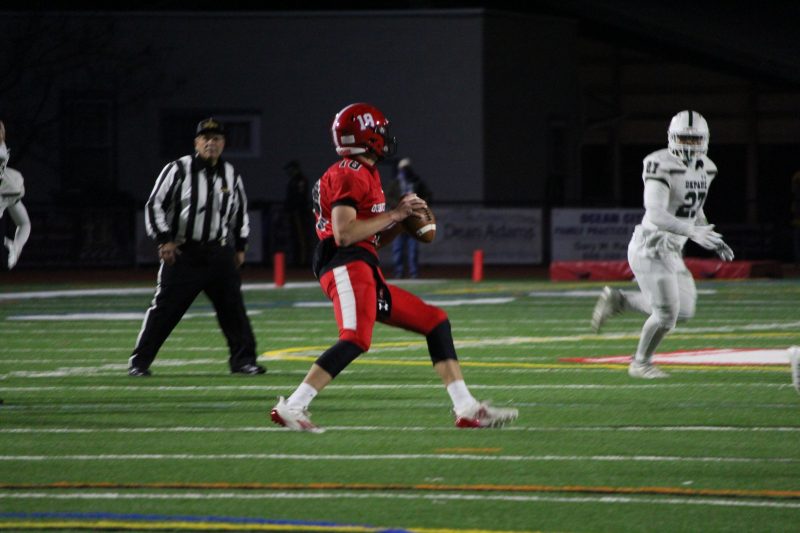
DePaul Catholic, the North Jersey powerhouse. They played in one of the toughest high school football conferences in the country with schools like Bergen Catholic, Don Bosco and St. Peter’s Prep. St. Peter’s was the alma mater of Steelers’ star Minkah Fitzpatrick, while Bergen and Bosco had produced players like Brian Cushing, Jabril Peppers and Matt Simms. These were teams who traveled all over the country to play and had their games televised on ESPN. Did we really want to schedule a team like that, just to have another game? Hell yes, the seniors said.
We hastily arranged the contest. DePaul made the two-and-a-half hour drive to Ocean City that Friday. Scouts from Rutgers and Boston College came to see a host of DePaul players, including their 6-foot-5 quarterback who was bigger than most of our linemen. It was our guys who caught their attention early, however. Somehow, despite being grossly outsized, we led 16-7 near the end of the first half.
DePaul scored right before halftime to gain some momentum. At the break, their coach must have delivered a pointed message about their performance. The second half was a different football game altogether. DePaul won going away. We earned a ton of respect, however, for both taking them on and playing them tough.
Our Thanksgiving game was on the road, so, with this their final home game, our seniors and their families hung around on the field long after DePaul departed. Some cried, others hugged each other or simply lingered. They didn’t want to leave. This was not what they’d expected. Just two days earlier we’d been preparing for the opportunity to erase the memory of our championship loss from 2019. Instead, we’d suffered our first loss of the season to a state power. It was frustrating. Confusing. Surreal.
Little did we know the strangest episode of the season was yet to come.
Two days after the DePaul game, it happened again. Our Thanksgiving opponent, Pleasantville, a team we’d played 98 times on Thanksgiving morning dating back to 1918, pulled out of the game. Once again, they cited Covid concerns. Cynically, that felt like code-speak for saying they didn’t want to play us. But who could say? What was a legitimate danger and what was a fraud? No one wanted to put kids at risk. Then again, if it was safe to play, we should play. It was difficult to know where the truth lay. All we did know was this — our program, and our seniors in particular, had again been deprived of a game.
The scramble for an opponent ensued once again. We had three days this time, a luxury compared to the previous week. But most teams in the state had either played their final game already or shut down due to the pandemic. The list of potential teams who could play, or were willing to play, was short. Things didn’t look promising.
Then Williamstown, the defending Group V state champion, came open when their Thanksgiving opponent had to shut down. Their coach and I worked out an arrangement. We would play Wednesday night, the night before Thanksgiving, at our place. It was now Monday, and it gave us one less day to prepare. But it would be a final home game for the seniors.
At 2:45 pm on Monday, just as I was heading out to practice, I got a text from our athletic director. The game was off. The county was raising the Covid threat level to orange, which meant high-risk, and the district would not permit another team to travel to Ocean City under those conditions.
I went out to the practice field, where the team had already assembled, and delivered the news. Players were initially furious. Then, to our surprise, the seniors led the team out to the field, where they ran through an hour of practice without any direction from the coaching staff. They practiced as we normally did, going through our tackling drills, position periods, group run, 7-on-7, team offense and defense, special teams. The coaches stood on the track and watched them. Marveled at them, really. This was how much they loved playing with one another. The season was over. But they wanted one more opportunity together.
When they were finished, we lined up along the sideline and bid farewell to the seniors. One by one they walked the line, shaking the hands of the underclassmen, embracing the coaches. It was draining, emotional. We said our thank yous and our goodbyes.
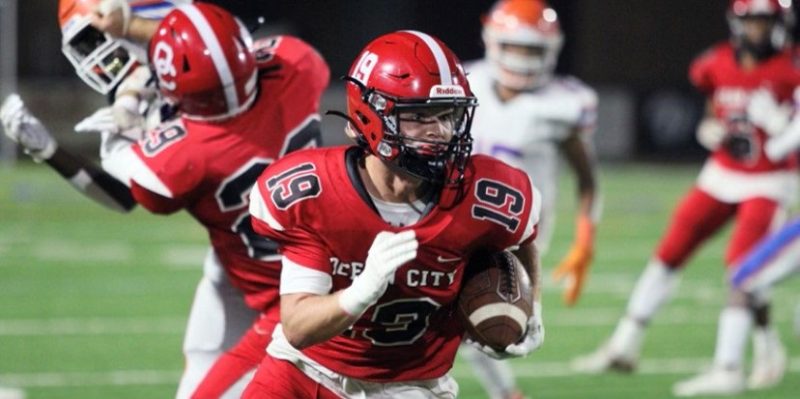
Jake Schneider, a 5’8, 145-pound receiver who had recently broken the league record set by current Rutgers standout Bo Melton for most career receptions, tied his cleats together and threw them up over a wire that ran from the stadium press box to a utility pole. Literally hanging up his cleats. It was a fitting way to end.
Only it wasn’t. That night, our athletic director called to say the game was back on. He had talked the board into allowing the contest. He wanted the team to finish on the field. I texted the players and arranged for practice on Tuesday. Jake Schneider had to find another pair of cleats.
Tuesday’s practice was terrible. We were flat, tired. I worried about what would happen Wednesday night. Williamstown was another area powerhouse. If we didn’t play our best they would embarrass us. We had looked like a punched-out fighter at practice. It wasn’t a good sign.
Sure enough, the first half against Williamstown did not go well. We moved the ball on offense but our defense, which had been so good all season long, could not stop them. We trailed at halftime. Jake Inserra gave a rousing speech, though, and the players responded. We were receiving the second-half kick and were confident we could come back.
Then our school principal was there, summoning me away from the team. Immediately I thought, “This can’t be good.” He had never interrupted me during a game before, for any reason.
“The game is over,” he said. “Williamstown had a player test positive. They just got the results. They are leaving.”
“Test positive?” I said. “When?”
“Earlier today. The Mom just informed the AD of the results. They’re leaving,” he said.
That is how our season came to its official conclusion – with 70 dumbfounded players kneeling in the end zone watching the opposing team board their bus and head home at halftime.
With our season having come to such an abrupt and anti-climactic end, I felt conflicted. On one hand, we’d had an historic year, beating St. Joe, making it to the pod championship and finishing in the Top 20 in the state of New Jersey for the first time this century.
On the other, our kids had been deprived of the opportunity to win that championship on the field and the final game, against Williamstown, had simply been absurd. You have to take the good with the bad, I suppose, especially during a pandemic. In the big picture, we were lucky to have a season at all.
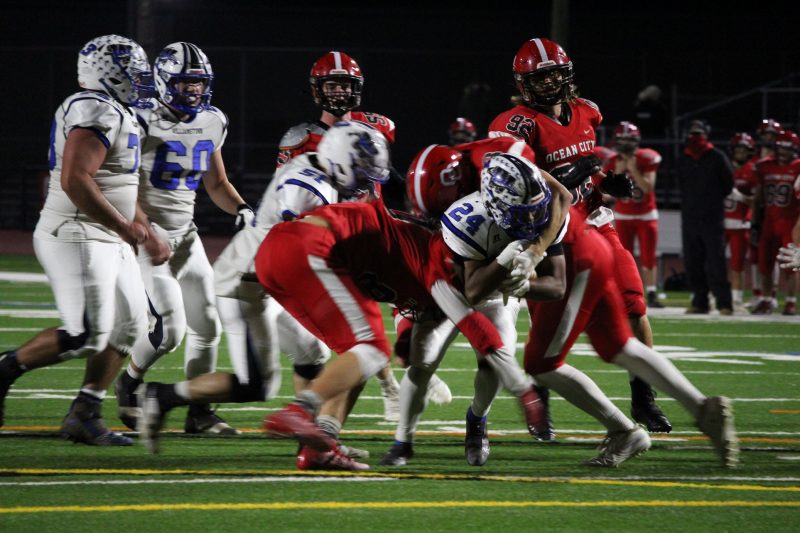
Then there’s this: on the Tuesday night before the Williamstown game, as I was tired, feeling discouraged about our practice that day and disappointed in how everything had transpired from the time Camden pulled out of the championship, I went to the local supermarket to pick up some groceries.
I drove there straight from practice and was wearing Ocean City football gear. A man stopped me inside and asked if I was a coach at the high school. I told him yes, I was the head coach. Immediately he launched into a speech about how happy he was to meet me, how much he and his family had enjoyed watching our games on the live-stream this season, and in particular what our team had meant to his son.
“You guys are the best thing in my son’s life right now,” he told me. “I can’t tell you how much he enjoys watching the games. He gets so excited, and he watches them over and over.”
The man asked if I could wait there for a second. He walked away and a few moments later came back with his son. The boy was a teenager, perhaps a bit older. He had Down’s Syndrome. His father introduced us. “This is the coach of Ocean City,” the man said. I could see a smile spreading from the boy’s face beneath his mask. I reached out to give the boy a pound. He tapped my knuckles with his own, then leaned in and gave me a one-armed hug. I could barely speak as I thanked his father for introducing us. Then, as inconspicuous as possible, I wiped the tears from my eyes once they’d walked away.
Sometimes I think, It’s only football. Why do I care so much? But then I realize that categorizing it as “only football” does a great disservice to the joy and the life lessons it has imparted.
I think back to my teammates as a player in high school and in college, of the knowledge of what we experienced together, the bond we share, and how no matter where we are or how much time has elapsed between correspondence, who we voted for, how much money we make or whatever God we worship, we can always connect over football.
I think of Gary Degenhardt, the coach who hired me at Ocean City back in 1992. Gary won three South Jersey titles as head coach and never met a person he didn’t address as “handsome.” Gary had a way of phrasing things that was unique and a million go-to sayings he would repeat ad nauseum. The one that stuck with me most was, “The guy who works is the guy who wins.” I am thankful for that lesson.
I think of my own assistants – Frank LaSasso, Sean Matthews, Paul Callahan, Tim Kelley, Mike Eisenstein, Chris Armstrong, John Bow, Mike Williscroft and Paul Baruffi – and of how much we’ve been through together. The hours away from our families. The time spent grinding through film, devising schemes, working towards a shared goal. There’s nothing quite like sharing a purpose with a group of like-minded people. They are excellent football coaches but they are teachers at heart. They care about our kids.
I think of that father and his son from the supermarket. Of what Friday nights have meant to them as they gather together in their home to watch our games on YouTube.
At Ocean City, I think not just of the Jake Inserras, the captains and role models, but the Anthony Kennys as well. Anthony Kenny, like Jake an over-achiever, was a scrappy defensive back who started for us in 2015-2016 as we were turning the corner from a struggling program to a competitive one.
He had a mega-watt smile, an infectious personality and the ability to make any room brighter with his mere presence. He won us a game at Atlantic City his junior year with an interception in the final minute to end a potential game-winning scoring drive. I can still see him being swallowed up by the pile of teammates that enveloped him, everyone jumping spastically, pure joy. He loved playing football for Ocean City. It was a part of who he was.
Anthony was killed in a car crash the night before Thanksgiving. We found out as we were leaving the field after Williamstown departed. It was a horrific ending to an evening that had already gone off the rails. The reason people fought so hard to play football this season was so that kids like Anthony would have the experience.
It’s a game, yes, but it means more than many can imagine to the young men who play it. Anthony was not a great student, but he wanted to be eligible for football so he studied and did his work. He did well enough to get accepted to college and played football at a small school outside of Philadelphia called Chestnut Hill. Football taught Anthony discipline, and teamwork, and gave him structure and a purpose. These are all things that are absent in the lives of many young people, especially during a pandemic. Best of all, football got Anthony into college, for which his family will forever be proud.
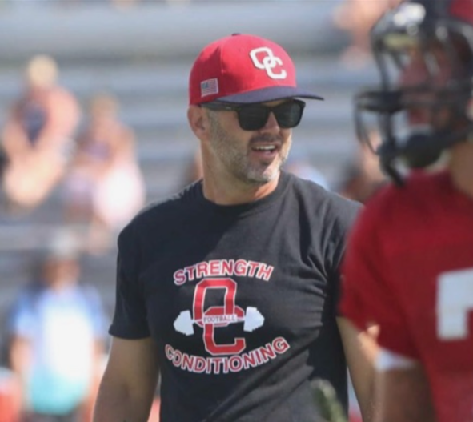
There were risks in playing this season. There are risks as well when kids are isolated and feel removed from the things they love. My college roommate lives in Connecticut, where his son is a junior and was slated to be a starting cornerback on a successful prep school team. Officials in Connecticut shut down the season before anyone had played a snap. My roommate’s family was devastated. He worries his son may be suffering from depression. That’s not melodrama. The consequences of not playing have been real.
I applaud the politicians and administrators in New Jersey who made the effort to have a season. There were 98 players in our program in grades 9-12 and we did not have a single positive test among them. That’s a tribute to the discipline of those young men. It also rewarded the decision-makers for having the courage to move forward. I am thankful our own district had faith in our ability to navigate the situation.
Our players learned some difficult truths this season. They learned that life is often unfair and can change in an instant. That’s a cold reality we sometimes try to shield from younger people. Beneath it, however, is something very valuable, something I believe our players also came to know. If the pandemic has taught us one thing, it is this: Be thankful for the moment. Nothing later is guaranteed.





